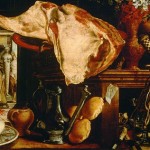 Matthew 26:31-46
Matthew 26:31-46
We know that Jesus was constantly in prayer, but we don’t have many of His prayers written down for us. He’s left us the prayer, of course, in the Lord’s Prayer. We have what is called the high priestly prayer of John 17. But today I’m especially glad for His prayer in the garden of Gethsemane.
This prayer of Jesus seems a lot like my prayers, and I think that just as Jesus taught by His words and His miracles, His example of prayer in tribulation has much to teach me today.
There are a lot of interesting things about Jesus’ prayer in the garden, but there’s one fact that stands out to me like a Neanderthal at a cocktail party. Do you see it?
It could be that Gethsemane is a garden. That’s interesting. The life of the first Adam began in a garden, and here is the life of the Second Adam, ending in a garden. And, of course, when Jesus is resurrected He is mistaken for the gardener, so He rises in a garden. What an intriguing irony: the garden which was Paradise but which was also the place where man fell is now a battlefield for Man.
It’s interesting as well that Jesus has to remind His disciples to watch and pray, lest they fall into temptation. There’s that word temptation again, and in a garden. And maybe Jesus tells them this because He knows He Himself is being tempted. That would make sense, that the serpent would return to the Garden to tempt the Second Adam, just as he tempted the first Adam. So maybe Jesus, the Second Adam, undoes what the first Adam did by resisting the temptation in the Garden.
It could be. But maybe the one startling fact that I see is something else. Maybe it’s the fact that Jesus even has to pray at all. Why would one who is God have to pray to God? Because the one who is God is also man, and as a man, He had to pray. It’s a mistake, a mistake well on the way to heresy, to think that just because Jesus was God that in His human nature He wasn’t fully man, with all of man’s needs and limitations – except for the notable exception of sin.
So it’s fascinating that Jesus has to pray at all. His prayer in the garden points to another aspect of His humanity: His soul was exceedingly sorrowful, even to death. Jesus knew what was coming. He had known for some time that He was to be crucified in Jerusalem, and He knew what pain and agony were in store for Him. He knew as well that He would be raised the third day: He’d already begun teaching His disciples that.
So why is He so sorrowful and deeply distressed? Didn’t He know that it would pass and that He’d be resurrected. Yes, He did. But would that completely anaesthetize the pain of the Cross? I’m not sure that any of us can comprehend what the Cross would have felt like to Jesus, not only the pain of the crucifixion that any criminal of the first century might have experienced, but the tailor-made Cross just for Him, weighted down with the sins of the world.
There is another remarkable thing. Being human, Jesus asks the Father to take the Cross, the cup, from Him. Knowing that it was the will of the Father, as a man He still wants to find a way out, if at all possible. Here He is, just a short time after He has offered the cup of life and salvation to His disciples, and He’s left holding the cup of the wrath of the Father for the sins of the world. It could hardly have seemed fair. And so He asks, out of sorrow and distress, for the cup to be taken from Him. In fact, He pesters the Father and asks three times.
But none of these are the one fact that stares out at me today like headlights in a cat’s eyes. No, the thing that strikes me most about Jesus’ prayer in Gethsemane is that the Father says, “No, my Son.” Here is Jesus, the only perfect man who ever lived, the very Son of the Father, the most pleasing person in the eyes of the Father, and the person who most faithfully prayed to the Father, asking the Father for something out of His sorrow and distress. And His loving Father tells Him, “No.”
There’s an important lesson here for us this morning. Have you ever wondered why some of your most fervent, persistent, righteous prayers are answered “No” by the Father? It doesn’t seem to make sense. But here, in the Garden with Jesus, such things make sense. Here in the Garden we’re confronted with the righteousness of the Son and His anguished prayers, and we’re confronted with the sleeping disciples. That’s us: sleeping through life while the Son does all the hard work! We know that we’re the ones who should feel such anguish. We know that we’re the ones who deserved the suffering of the Cross – and much more.
And when we see our Lord praying so fervently and righteously, our lives come back in focus. We suddenly see what we really deserve and what God has given us instead. And we see our righteous Lord in anguish for us, when He has done nothing to deserve it. And everything in our lives seems small in comparison. It has a way of shutting one’s mouth.
As I watch and hear my Lord suffer for me, another thought occurs to me. What if my suffering, and yours, is necessary for the redemption of the world? What if we are to fill up what is lacking in the sufferings of Christ? What if God can’t save the world without suffering being involved? What if it’s hardwired into the plan of redemption?
I know that I am united to Jesus Christ and that for the most part that is nothing but bliss. But I also know that I am united to Him in His suffering, as He is to me, and so is it so strange that I also should suffer? Actually, the fact that I suffer shouldn’t be strange at all. I deserve far worse, and one day it shall all be ended and all that will remain will be Christ within me and the perfection of heaven.
And if God the Father can say “No” to even the Son, then I understand a whole lot more why He so often seems to say “No” to me, when I ask for my suffering and distress to be taken away.
This is why I love Jesus’ prayer in the Garden of Gethsemane. This is why it seems so human to me: it feels like my life many times, and now I understand it much better. I know as well that the prayer in the Garden and even the Crucifixion were limited in time. They passed, and so shall all of the difficult and painful things in my life. And if I have to endure them with my Lord, for my Lord, for several more decades, then I can do it.
Through Jesus’ prayer in the Garden, I come to the point where I want what He wants, which is nothing but the will of the Father. And if that means some suffering, then I’m O.K. with that because the Father whose will I desire to do is my good and loving Father who raised His Son from the dead and has promised to raise me up as well.
So thank you God, for now I’m ready to pray in my own little garden today, knowing who You are and who I am, through the prayer of Your beloved Son, who continues to pray for me in heaven.
Prayer: Our Father, who art in heaven, hallowed be Thy name. Thy kingdom come. Thy will be done, on earth as it is in heaven. Give us this day our daily bread. And forgive us our trespasses, as we forgive those who trespass against us. And lead us not into temptation, but deliver us from evil. For thine is the kingdom, and the power, and the glory, for ever and ever. Amen.
Points for Meditation:
1. Meditate on Jesus’ prayer in the Garden of Gethsemane. How can it help to put your life and its suffering into perspective?
2. How might you make your prayers more like Jesus’ prayer?
Resolution: I resolve to accept the Lord’s will in my life today when I pray faithfully and don’t receive what I ask for.
© 2012 Fr. Charles Erlandson
Garden of Gethsemane tableau – CC Image courtesy of Librarian by dierk schaefer on Flickr











